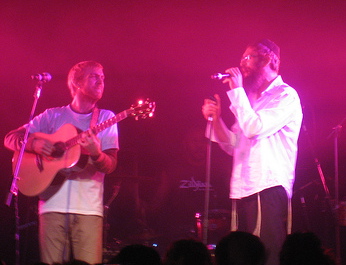So before I get to the topic at hand, here are a couple of links. First, I got to speak to The American Prospect Magazine. The interview was with Courtney E. Martin, a very cool lady who I hope will possibly get more involved in the ID Project, maybe even blogging right here. Second, below is a video interview that Mark Molaro did last week with Naomi Klein (author of No Logo and Shock Doctrine). I had the honor of sitting in the same seat as Naomi a few hours later and being interviewed by Mark (no I didn’t get to meet her!). That interview should be up soon. Mark has interviewed a bunch of great thinkers. You can youtube him if you want to see more.
So here’s my question today: Why are human beings so thoroughly and consistently obsessed with the apocalypse?
The question was crystallized for me a few months ago up in Boston, chilling with my friend Lodro Rinzler. We went to the Boston Museum of Fine Art which has a surprisingly large collection of Buddhist art. We came across recovered tablets of the Lotus Sutra from 12th century Japan. Turns out that the sutras were buried then because monks were convinced that a dark apocalypse was coming and they wanted to preserve the wisdom for a future age. So they had an apocalypse complex in 12th century Japan!
The notion of a dark age, or Kali Yuga, is a theme that runs like the Mississippi River through Hindu and Buddhist mythologies. But why?My friend Peter is an expert/enthusiast on the whole Peak Oil situation. When he approached our Buddhist teacher, Sakyong Mipham Rinpoche, to ask his opinion of peak oil, Rinpoche supposedly chuckled and said something like: “Human beings have thought the world was ending since the beginning of time.”
Recently I read The Eden Express by Kurt Vonnegut’s son Mark. It’s a memoir of him leaving Swarthmore and starting a commune in British Columbia with friends in 1970 (he soon went crazy). But they also thought America and civilization were seriously doomed. Seems like every generation has its own version of thinking the end is here.
My own Kali Yuga Complex (KYC for those diagnosing at home) started sometime in 2000. I made it through the Y2K scare the year before unfazed. Maybe in the fall of 2000 I had a dark foreboding about a Dubya presidency (remember Nader saying there was no difference between a Bush and Gore victory? Is there a right speech way to call him an asshole? hope so…), and a dark foreboding about the momentum of our society in general. Or maybe it was a more personal neurosis projected onto an apocalyptic storyline. Maybe I was just a recent college grad who knew I wanted to meditate and write, but beyond that had very little clarity on how to apply jumper cables to the untested apparatus known as my adult life. The Kali Yuga Complex gave my nerves something to hold onto. Not something comfortable, but something important at the very least. The end was near, and I was therefore REAL!
And now the new narrative for our KYC is the 2012 Mayan mythology about the end of the calendar and a global transformation of consciousness, most interestingly articulated by Daniel Pinchbeck in his book 2012: The Return of Quetzalcoatl. Not that I don’t think the world is slowly but momentously going downhill (an entirely reversible trend, by the way). But do I think I’m important enough to be there at the spiritual climax? Seems like a new ego-tic. At least that’s how it feels in my mind. Maybe the Book of Revelations was just the fever-dream of a neurotic who wanted to be important enough to have a story to tell. What do you think?
While we are on the subject of apocalypse, I wanted to share a few of my favorite apocalyptic works.
Best Apocalyptic Movie: Children of Men (in my opinion the best movie of 2006 that didn’t quite get the attention it deserved. *Note that Bladerunner doesn’t count because it’s dystopian without a clear apocalypse looming).
Best Apocalyptic Song: tie between Prince’s (now-obsolete) “1999” and Bishop Allen’s “Eve of Destruction.”
Best Apocalyptic Novel: Cormac McCarthy’s “The Road” (a bit overwrought but a beautiful novel nonetheless – thank you Oprah’s Book Club!)
Most Hopeful Post-Apocalyptic Narrative: “Star Trek” (A lot of people don’t know this but the basic premise of all things Star Trek is that humanity is devastated by WWIII in the mid 21st Century and afterwards rises like a Phoenix to create enlightened society on Earth, at which point they become compassionate explorers of the galaxy).
More from Beliefnet and our partners

